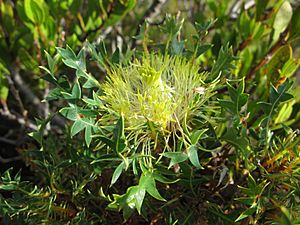Banksia armata var. ignicida facts for kids
Quick facts for kids Banksia armata var. ignicida |
|
|---|---|
 |
|
| Variety ignicida in Cape Le Grand National Park | |
| Scientific classification |
|
| Kingdom: | Plantae |
| Clade: | Tracheophytes |
| Clade: | Angiosperms |
| Clade: | Eudicots |
| Order: | Proteales |
| Family: | Proteaceae |
| Genus: | Banksia |
| Species: | |
| Varietas: |
B. a. var. ignicida
|
| Trinomial name | |
| Banksia armata var. ignicida (A.S.George) A.R.Mast & K.R.Thiele
|
|
Banksia armata var. ignicida is a special type of shrub that only grows in Western Australia. It's a bit different from its close relative, Banksia armata var. armata. The main difference is that Banksia armata var. ignicida doesn't have a special woody lump called a lignotuber at its base. This means it can't regrow from its roots after a fire, unlike many other plants. This variety is also usually taller. Its leaves are longer with fewer side lobes, and its flowers are longer too.
Contents
What Does This Banksia Look Like?
Banksia armata var. ignicida is a shrub that can grow up to 3 meters (about 10 feet) tall. It does not have a lignotuber, which is a woody base that helps some plants regrow after a fire.
Leaves and Flowers
Its leaves are usually 60 to 80 millimeters (about 2.4 to 3.1 inches) long. They are also 20 to 25 millimeters (about 0.8 to 1 inch) wide. The leaves have deep, saw-like edges with five to eight sharp, triangular points on each side.
The flowers are yellow. The main part of the flower (called the perianth) is 30 to 39 millimeters (about 1.2 to 1.5 inches) long. The female part of the flower (the pistil) is 35 to 42 millimeters (about 1.4 to 1.7 inches) long.
How Scientists Named This Plant
The first samples of Banksia armata were collected in 1801. A scientist named Robert Brown described them in 1810. He first called the plant Dryandra armata.
The Name Ignicida
In 1996, another scientist, Alex George, described two different types (varieties) of Dryandra armata. He collected the first samples of Dryandra armata var. ignicida near a place called Woodanilling.
The name ignicida comes from two Latin words. Ignis means "fire," and -cidus means "killing." This name was chosen because this type of plant is killed by fire. This is because it doesn't have a lignotuber to help it regrow.
Changing to Banksia
Later, in 2007, scientists Austin Mast and Kevin Thiele moved all Dryandra species into the Banksia group. This change is now accepted by plant experts in Australia.
Where Does This Banksia Grow?
This special variety of Banksia grows in many parts of the south-west of Western Australia. You can find it widely spread between the towns of Pingelly and Katanning. It also grows further east, all the way to Mount Ragged in the Cape Arid National Park.
 | Toni Morrison |
 | Barack Obama |
 | Martin Luther King Jr. |
 | Ralph Bunche |

